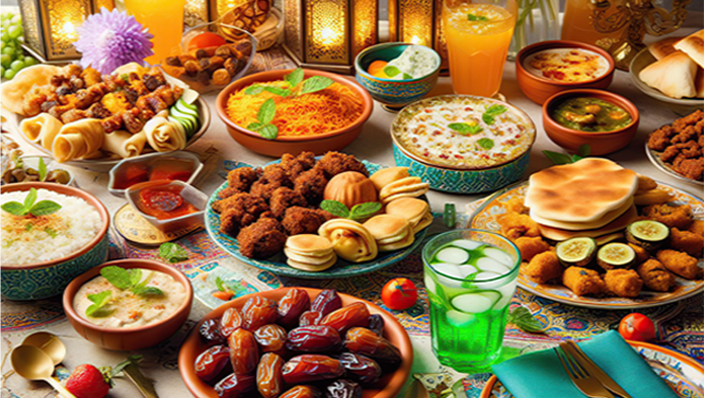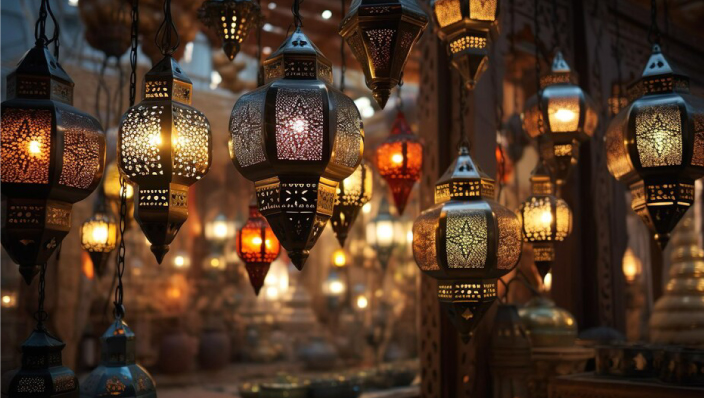 Arabic Traditions
Arabic Traditions
 Arabic Traditions
Arabic Traditions
Welcome to a journey through the history of the Arab month of Ramadan, which holds deep significance in Arab culture, serving as a time for fasting, reflection, and spiritual renewal.
Understanding the historical roots of Ramadan is of utmost importance, as it provides valuable insights into the evolution of this sacred month within Arab society, reflecting a blend of religious and cultural elements that have shaped Arab identity over the centuries.
In this exploration, we will trace the historical origins of Ramadan and how its traditions and atmosphere have evolved.
We will explore how Ramadan demonstrates the complex relationship between faith, culture, and social customs in Arab societies. Additionally, we will uncover the rituals associated with Ramadan, from communal iftars to acts of charity and giving, which enhance a sense of unity and generosity that transcends boundaries and unifies communities.
Join us on this journey as we celebrate the spirit of Ramadan, honor its timeless traditions, and foster the spirit of unity and compassion that defines this blessed month in the Arab world.
Content:
- Introduction to Ramadan and its significance in Arab culture.
- Ramadan throughout history: How was Ramadan celebrated in ancient Arab hospitality?
- The evolution of understanding and practices of the holy month over time in Arab culture.
- The customs and traditions associated with Ramadan in various eras and Arab regions.
- The religious, social, and cultural practices that distinguish Ramadan.
- The importance of hospitality in Ramadan and how it has evolved during the holy month.
- Traditional foods and cuisines are served during Ramadan.
- Popular beverages associated with the blessed month of Ramadan.
- The importance of understanding and respecting Ramadan's history and traditions in the Arab world.
Ramadan and its significance in Arab culture:
Ramadan is an opportunity for fasting and bringing ourselves close to Allah, so its importance in Arab culture manifests in several aspects:
- Ramadan is an opportunity to enhance spirituality and faith, as we engage in prayers, Quran readings, and intensified charitable acts during this month.
- The blessed month is an ideal time for family and community bonding, as individuals gather for iftars and suhoor, strengthening social ties and deepening human relationships.
- It's a chance to reach out to the poor and needy, with increased acts of charity and assistance reflecting high humanitarian values in Arab culture.
Ramadan throughout history: How was Ramadan celebrated in ancient Arab hospitality?
In ancient Arab hospitality, welcoming the month of Ramadan was eagerly anticipated, marked by joy and festivity, and considered an opportunity for spiritual renewal and strengthening social and familial bonds. Atmospheres were filled with joy and happiness, reflecting Arab authenticity and heritage. Here's a look at how celebrations and welcoming the holy month unfolded in ancient Arab hospitality:
Welcoming the holy month: Welcoming Ramadan began days before its arrival, with families cleaning and decorating their homes in anticipation of this auspicious month.
Food and cuisine: Food played a significant role on Arab tables during Ramadan, with the preparation of delicious Eastern and Western dishes for guests, family, and neighbors. Among the famous dishes were sambousek, fattah, and traditional sweets like kunafa and qatayef.
Hospitality and welcome: Hospitality and welcoming guests were prominent features of welcoming Ramadan in ancient Arab hospitality, as families opened their doors to receive guests, offering them generous hospitality and delicious food.
Prayer and worship: Prayer and worship are a crucial part of the holy month, as families ensure the performance of prayers, Quranic recitations, and obedience during this blessed month.
Tolerance and communication: Ramadan was an opportunity to strengthen family and friends' bonds, with families visiting each other, exchanging visits and gifts, and fostering a spirit of tolerance and cooperation among community members.
In these ways, ancient Arab hospitality celebrated Ramadan uniquely and distinctively, with atmospheres filled with love, hospitality, delicious food, and devout prayers, making it an unforgettable experience in people's memories.
Don't miss: A touch of authenticity embraces your gatherings

The evolution of understanding and practices of the holy month over time in Arab culture:
The evolution of understanding and practices of Ramadan over time in Arab culture reflects multiple changes and developments, making it a story rich in diversity and evolution. In ancient times, Ramadan practices were primarily associated with religious activities such as fasting, prayers, and reading the Quran, with a focus on drawing closer to Allah and enhancing spiritual faith.
Over time, Ramadan practices witnessed diversity and development in the customs and traditions associated with it. New customs emerged, such as exchanging greetings and gifts, and the importance of hospitality increased, with a variety of foods being offered during iftar and suhoor meals.
In modern times, with the advancement of communication and media, Ramadan practices are increasingly influenced by global cultural factors. Social celebrations and religious events in mosques and communities increase, and new traditions emerge, such as decorating streets and markets with lights and decorations.
However, Ramadan remains at the heart of Arab culture, preserving its authentic values and spiritual essence, with a continued focus on fasting, prayers, tolerance, and generosity as the foundation of this blessed month in the fabric of Arab life.
The customs and traditions associated with Ramadan in various eras and Arab regions:
Reviewing the customs and traditions associated with Ramadan in various eras and Arab regions reveals a rich and diverse array of manifestations of religion, culture, and popular traditions throughout the ages. In the early Islamic eras, religious practices centered around fasting, prayers, and Quranic readings, with emphasis on ethics, tolerance, and giving. There were also social traditions associated with hospitality and visiting between family and friends for exchanging greetings and gifts.
As time progressed and social and cultural circumstances changed, Ramadan customs underwent gradual transformations. Social celebrations and religious events in public places and mosques increased, with the emergence of new traditions such as decorating homes and streets with lights and decorations and offering traditional foods and delicious sweets.
In some Arab regions, specific traditions emerge that vary with different cultures and local traditions. For example, in Morocco and Tunisia, Quranic readings and religious celebrations are prominent, while in the Gulf countries, iftar is known for the variety of foods and drinks served, and in other Arab regions, popular traditions such as stories and traditional games that are part of the rituals of Ramadan.
Despite this diversity, Ramadan remains true to its religious and social spirit, continuing to be a time for strengthening family, social, and spiritual bonds among members of the Arab community.
The religious, social, and cultural practices that distinguish Ramadan:
Ramadan is distinguished by a range of religious, social, and cultural practices that give it a unique and special character. Here's an overview of some of these practices:
Religious practices:
Fasting: Fasting is considered one of the fundamental pillars of Ramadan, during which Muslims refrain from eating, drinking, and sexual activity from dawn until sunset.
Prayer: There is an increase in congregational prayers in mosques during Ramadan, with a focus on Taraweeh prayers and Quranic recitations.
Zakat and charity: Islam encourages social solidarity and financial assistance to the poor and needy, with increased donations and charity during Ramadan.

Social practices:
Hospitality: Arab families are known for their hospitality and hosting iftar for relatives and friends during Ramadan, enhancing social ties and deepening human relationships.
Community iftars: Families and friends gather for communal iftar meals, providing opportunities for exchanging gifts, greetings, and news.
Cultural practices:
Food and cuisine: Ramadan is characterized by offering a variety of traditional foods and beverages that vary from region to region, reflecting the cultural diversity of Arab communities.
Arts and culture: Many cultural and artistic events are organized during Ramadan, such as art exhibitions, theatrical performances, and musical concerts, reflecting the cultural diversity and richness of the region.
In summary, Ramadan is characterized by the diversity of its religious, social, and cultural practices, reflecting the spiritual and solidarity spirit that distinguishes the holy month in the Arab world.
Don't miss : Exploring the World of Coffee (Pros and Cons)
The importance of hospitality in Ramadan and how it has evolved during this month over time:
Hospitality holds a prominent place in Ramadan, being an integral part of the experience of this blessed month in the Arab world. Hospitality embodies values of generosity, kindness, and welcome, reflecting solidarity and harmony among members of society.
Since ancient times, hospitality has been considered a sacred value in Arab culture, especially during the holy month of Ramadan. Families would open their doors to receive guests, travelers, and the poor, offering them iftar, reflecting the spirit of cooperation and mutual love among members of the community.
Over time, the concept of hospitality during Ramadan has undergone significant development. In ancient times, hospitality meant offering food and drinks to guests and inviting them to participate in communal iftars at homes and mosques.
With social and cultural developments, Ramadan hospitality practices have become more diverse and complex. Communal iftars in hotels, restaurants, and homes have increased, and the exchange of gifts and greetings has become an essential part of the hospitality experience during this month.
Additionally, the concept of hospitality during Ramadan has been influenced by the development of communication and technology. It is now possible to exchange greetings and invitations through social media, and virtual iftars online have added a new dimension to the hospitality experience in this blessed month.
In general, the importance of hospitality in Ramadan lies in strengthening social bonds and deepening human relationships, reflecting the values of solidarity and harmony that emerge in Arab society during this blessed month.
Review of traditional foods served during Ramadan:
During the holy month, a variety of traditional foods are served during iftar and suhoor meals. These foods reflect the diversity of Arab cultures and their various expressions in food preparation. Among the famous foods served during Ramadan are:
Samosas: Samosas are delicious and favorite dishes served during Ramadan, where the dough can be filled with minced meat, cheese, or vegetables and then fried until golden brown.
Sweets: Sweets served during Ramadan vary from traditional Arabic sweets such as baklava, knafeh, and maamoul to international desserts such as cakes and cupcakes.
Soups: Soups are favorite meals during suhoor and are served in a variety of flavors such as Arabic soup, green soup, and chicken soup.
Fruits and juices: Fruits and juices are essential in iftar and suhoor meals, providing the body with the necessary vitamins and nutrients after hours of fasting.
These foods are culturally and socially significant during Ramadan, as families and friends gather around the table to eat together, enhancing social ties, and deepening family relationships, and friendships. Sitting together to eat during this month creates an atmosphere of closeness and camaraderie, promoting a sense of participation and solidarity in the community. Additionally, iftar and suhoor meals are opportunities to exchange conversations, and news, and strengthen emotional bonds between individuals, making them unforgettable experiences during this blessed month.

Most popular beverages associated with the blessed month of Ramadan:
In the Ramadan table in Arab countries, you find a variety of beverages served for the fasting people's iftar and suhoor. Here are the most popular beverages on the Ramadan table in Arab countries:
Coffee: Coffee is considered a staple beverage on the Ramadan table, whether it's traditional Arabic coffee or black coffee.
Tea: Many prefer to drink tea, whether green tea or black tea, during suhoor or iftar meals.
Natural juices: Natural juices such as lemon juice, orange juice, and seasonal fruits are served to replenish fluids and provide vitamins.
Licorice: A traditional beverage made from a mixture of water, barley, and sugar, believed to provide energy during fasting hours.
Hibiscus tea: It is a refreshing and healthy drink, containing many health benefits such as lowering blood pressure, strengthening the immune system, and replenishing lost fluids during fasting hours.
Almond juice: Almond juice is a delicious and nutritious beverage preferred during iftar or suhoor. To prepare almond juice, almonds are boiled in water for a period, then ground and strained to obtain a refreshing juice.
These are some of the most popular beverages served on the Ramadan table in Arab countries, adding a special character to the iftar and suhoor experience in this blessed month.
what about Exceptional Recipes for Arabic Tea and Coffee?
The importance of understanding and respecting Ramadan history and traditions in the Arab world:
Understanding and respecting Ramadan's history and traditions in the Arab world is of utmost importance, as the month of Ramadan represents values and principles that are as significant as many cultural and religious values that reinforce Arab identity. Here are some reasons highlighting the importance of understanding and respecting these traditions:
Respect for roots and identity: Ramadan is part of Arab identity, and understanding and respecting its traditions reflect respect for the deep-rooted history and heritage of the Arab people.
Enhancing spirituality and solidarity: Ramadan is an opportunity to enhance spirituality and draw closer to God, as well as to strengthen solidarity and cooperation among members of the Arab community.
Preserving cultural heritage: Ramadan is part of Arab cultural heritage, and understanding and respecting its traditions contribute to preserving this heritage and passing it on to future generations.
Promoting unity and solidarity: People come together during Ramadan to share meals and perform worship together, promoting unity, and solidarity, and strengthening social relationships within the community.
In summary, understanding and respecting Ramadan history and traditions in the Arab world enhances cultural and religious identity, and contributes to promoting spirituality, solidarity, and unity among community members.

We can say that Preserving Ramadan values and traditions among the new generations is of paramount importance to ensure the continuity of the religious and cultural spirit that distinguishes this blessed month. Here are some ways to achieve this and promote unity and solidarity during Ramadan:
Education and awareness: It is essential to raise awareness about the importance of Ramadan and its traditions among the new generations through education and awareness, whether in schools or at home, by explaining the values and principles of religion and culture associated with this month.
Participation in Ramadan activities: Unity and solidarity can be enhanced through participation in various Ramadan activities and events such as communal prayers, communal iftars, and volunteering in food distribution to the needy.
Promoting social relationships: Families should be encouraged to strengthen social relationships among their members during Ramadan by organizing visits, family gatherings, and friendships, and exchanging gifts and invitations with neighbors and friends.
Donation and charity: Ramadan is an opportunity to enhance the spirit of giving and solidarity by donating to the needy, participating in charitable activities, and engaging in volunteer campaigns aimed at helping those in need.
Celebrating Ramadan traditions: Families should be encouraged to celebrate old Ramadan traditions such as reading the Quran, preparing traditional foods, and decorating homes with Ramadan decorations, to enhance the blessed spirit and family traditions in this blessed month.
In summary, preserving Ramadan values and traditions among the new generations requires the cooperation of all members of the community to promote unity and solidarity and contribute to building a society characterized by peace and love in this blessed month.
In conclusion, we reaffirm the importance of understanding and respecting Ramadan's history and traditions in the Arab world. Ramadan is not just a period of fasting and abstaining from food and drink, but a comprehensive experience that includes spirituality, culture, solidarity, and social interaction.
Our commitment to preserving these values and traditions among the new generations reflects our commitment to Arab and religious identity and enhances the blessed spirit that distinguishes Ramadan, making it an opportunity to strengthen social bonds and deepen human relationships.
Therefore, let us continue to build bridges of communication and understanding, and work together to promote the spirit of unity and solidarity in this blessed month, to elevate our society to new levels of peace, progress, and positive interaction.